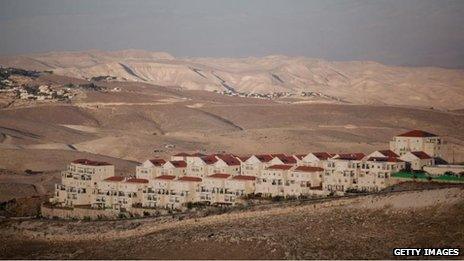Israel settlements: UN steps up pressure
- Published

About 500,000 Jewish residents live in settlements in the West Bank and East Jerusalem
The UN is stepping up pressure on Israel over its settlement building on occupied Palestinian land in the West Bank and East Jerusalem.
The secretary general and all Security Council members except the US demanded an immediate halt to new construction.
Israeli Prime Minister Benjamin Netanyahu said his government would press ahead with settlement expansion.
The US protects Israel at the UN but the state department accused Israel of "a pattern of provocative action".
Spokeswoman Victoria Nuland said settlement activity put the goal of peace "further at risk".
New homes
Also on Wednesday, Jerusalem's planning committee granted approval for 2,610 homes in a new settlement in East Jerusalem called Givat Hamatos - the first to be built in the area since 1997.
Meanwhile, tenders have been announced for several settlements in the West Bank for a total of 1,000 new homes.
Israel captured East Jerusalem in the 1967 Middle East war and annexed it as part of its capital, in a move never recognised internationally.
Palestinians want the area to be capital of a state they seek to establish in the West Bank and the Gaza Strip, land also captured by Israel.
The four European members of the UN Security Council - France, Germany, the UK and Portugal - issued a statement saying they were "extremely concerned" by Israel's intentions to build more settlements.
"If implemented, these plans would jeopardise the possibility of a contiguous, sovereign, independent and viable Palestinian State and of Jerusalem as the future capital of both Israel and Palestine," the statement said, external.
Israel's announcements "send a negative message and are undermining faith in its willingness to negotiate," it warned.
Israel announced its settlement expansion in response to a recent UN decision to recognise Palestine as an observer state, which it strongly opposed.
The Israeli ambassador to the UN, Ron Prosor, insisted that settlements were not the major hurdle to peace, and stressed that the latest announcements were part of a bureaucratic process known as "planning and zoning".
He repeated Israeli demands that Palestinians return to peace talks without preconditions.
The last round of direct talks broke down in late 2010 following a dispute over settlement construction in the West Bank and East Jerusalem.
For his part, Mr Netanyahu said settlement building would not stop.
"We are going to build in Jerusalem for all its residents," he said. "This is something that has been done by all previous governments and this is something that my government will continue to do."
About 500,000 Jews live in more than 100 settlements built since the occupation of the West Bank and East Jerusalem. The settlements are considered illegal under international law, though Israel disputes this.
Earlier this week, Israel gave approval for 1,500 more homes at the Ramat Shlomo settlement in East Jerusalem.